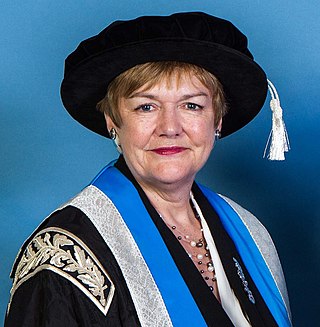Related Research Articles
In medicine, comorbidity refers to the simultaneous presence of two or more medical conditions in a patient; often co-occurring with a primary condition. It originates from the Latin term morbus prefixed with co- ("together") and suffixed with -ity. Comorbidity includes all additional ailments a patient may experience alongside their primary diagnosis, which can be either physiological or psychological in nature. In the context of mental health, comorbidity frequently refers to the concurrent existence of mental disorders, for example, the co-occurrence of depressive and anxiety disorders. The concept of multimorbidity is related to comorbidity but is different in its definition and approach, focusing on the presence of multiple diseases or conditions in a patient without the need to specify one as primary.

Polypharmacy (polypragmasia) is an umbrella term to describe the simultaneous use of multiple medicines by a patient for their conditions. The term polypharmacy is often defined as regularly taking five or more medicines but there is no standard definition and the term has also been used in the context of when a person is prescribed 2 or more medications at the same time. Polypharmacy may be the consequence of having multiple long-term conditions, also known as multimorbidity and is more common in people who are older. In some cases, an excessive number of medications at the same time is worrisome, especially for people who are older with many chronic health conditions, because this increases the risk of an adverse event in that population. In many cases, polypharmacy cannot be avoided, but 'appropriate polypharmacy' practices are encouraged to decrease the risk of adverse effects. Appropriate polypharmacy is defined as the practice of prescribing for a person who has multiple conditions or complex health needs by ensuring that medications prescribed are optimized and follow 'best evidence' practices.

Alan Julian Macbeth Tudor-Hart, commonly known as Julian Tudor Hart, was a general practitioner (GP) who worked in Wales for 30 years, known for theorising the inverse care law. He produced medical research and wrote many books and medical articles.
Multimorbidity, also known as multiple long-term conditions (MLTC), means living with two or more chronic illnesses. For example, a person could have diabetes, heart disease and depression at the same time. Multimorbidity can have a significant impact on people's health and wellbeing. It also poses a complex challenge to healthcare systems which are traditionally focused on individual diseases. Multiple long-term conditions can affect people of any age, but they are more common in older age, affecting more than half of people over 65 years old.

Professor Pamela Gillies is a Scottish academic and educator who served as Principal and Vice-Chancellor of Glasgow Caledonian University from March 2006 until January 2023.
Bangour General Hospital was a hospital just west of the village of Dechmont, West Lothian, Scotland. It had its origins during the Second World War when hospital bed numbers in Scotland were greatly expanded to deal with the anticipated increase in civilian and military war casualties. The Emergency Hospital Service (Scotland) scheme resulted in seven new hospitals being built, while at Bangour Village Hospital in West Lothian an annexe of five ward blocks was built and this developed into Bangour General Hospital after the war. This hospital served the population of West Lothian as a general hospital and also included a maxillo-facial unit serving the Lothian region and a burns and plastic surgery unit serving much of east Scotland, the Borders and the Highland region. The hospital services were transferred to the newly built St John's Hospital at Livingston during 1989–90, and Bangour General Hospital closed in 1990 and was subsequently demolished.
Allyson Pollock is a consultant in public health medicine and was the Director of the Institute of Health and Society, Newcastle University. She is an academic who is known for her research into, and opposition to, part privatisation of the UK National Health Service (NHS) via the Private Finance Initiative (PFI) and other mechanisms.

Professor José María Valderas Martínez is an Academic General Practitioner and health services researcher.
The National Institute for Health and Care Research (NIHR) is the British government's major funder of clinical, public health, social care and translational research. With a budget of over £1.2 billion in 2020–21, its mission is to "improve the health and wealth of the nation through research". The NIHR was established in 2006 under the government's Best Research for Best Health strategy, and is funded by the Department of Health and Social Care. As a research funder and research partner of the NHS, public health and social care, the NIHR complements the work of the Medical Research Council. NIHR focuses on translational research, clinical research and applied health and social care research.
The NHS Health Check is a preventive healthcare programme offered by Public Health England. The programme invites adults aged between 40 and 74 in England for a health check-up every five years to screen for key conditions including heart disease, diabetes, kidney disease, and stroke. Local authorities are responsible for the commissioning of the programme, with GPs being the most common provider, followed by community outreach and pharmacy providers.
Michael Alexander Leary Pringle CBE is a British physician and academic. He is the emeritus professor of general practice (GP) at the University of Nottingham, a past president of the Royal College of General Practitioners (RCGP), best known for his primary care research on clinical audit, significant event audit, revalidation, quality improvement programmes and his contributions to health informatics services and health politics. He is a writer of medicine and fiction, with a number of publications including articles, books, chapters, forewords and guidelines.
John Calum Macdonald Gillies FRSE is a medical doctor who worked as general practitioner (GP) and who is the Depute Director of the Scottish School of Primary Care. He was formerly the chair of the Scottish Council of the Royal College of General Practitioners (RCGP) from November 2010 to November 2014.
David Oliver is a British physician specialising in the geriatric medicine and acute general internal medicine. He was President of the British Geriatrics Society from 2014 to 2016. He is Visiting Professor of Medicine for Older People in the School of Community and Health Sciences at City University London and a King's Fund Senior Visiting Fellow. He was formerly the UK Department of Health National Clinical Director for Older People's Services from 2009 to 2013. He is a researcher, writer, teacher and lecturer on services for older people and a regular blogger, columnist and media commentator. He was elected as Clinical Vice President of the Royal College of Physicians, London. In April 2022 he was elected as president of the Royal College of Physicians but withdrew in July 2022 after he had contracted Covid 19 and "no longer felt able to do it justice".
Frank Sullivan is a Scottish medical doctor who works as a general practitioner (GP) and who is a medical researcher. He is Director of Research at the School of Medicine at University of St Andrews. He was the first Gordon F. Cheesbrough Research Chair in Family and Community Medicine at North York General Hospital, Canada. He was the director of the Scottish School of Primary Care from 2007 to 2014.
Nursing Studies is an academic unit within the School of Health in Social Science at University of Edinburgh. A teaching unit was established in 1956, the first to be part of a British university. The unit's initial focus was on education for nursing teachers and leaders. In 1960 it offered the first degree courses in nursing in the UK. It became a department of the university in 1965 and six years later gained a Chair of Nursing Studies, which was the first to be established in Europe. The unit also had a Nursing Research Unit, which opened in 1971 and ran for more than twenty years. The unit continues to offer nurse education at undergraduate, postgraduate and research levels.
Richard Scott was a Scottish medical doctor who was the first professor of general practice. He worked as an academic general practitioner (GP) in Edinburgh. He was involved with setting up the first ever university general practice in 1948, developed the University of Edinburgh's general practice teaching unit and in 1963 was appointed to the first academic chair in general practice.
The Medication Appropriateness Tool for Comorbid Health conditions during Dementia (MATCH-D) criteria supports clinicians to manage medication use specifically for people with dementia without focusing only on the management of the dementia itself.
James Hill "Hamish" Barber was a doctor and medical academic. He was the first professor of general practice at the University of Glasgow and wrote the first comprehensive textbook in this field.
Azeem Majeed is a Professor and Head of the Department of Primary Care & Public Health at Imperial College, London, as well as a general practitioner in South London and a consultant in public health. In the most recent UK University Research Excellence Framework results, Imperial College London was the highest ranked university in the UK for the quality of research in the “Public Health, Health Services and Primary Care” unit of assessment.

The Nursing & Health Care School, University of Glasgow, is a speciality area within the School of Medicine, Dentistry and Nursing in Glasgow, Scotland. The School has offered a degree course in Nursing since 1977, introduced under the Dean of the Faculty of Medicine at the time, Professor Edward McGirr.
References
- 1 2 Mercer, SW; Gillies, J; Gunn, J; Fortin, M; van den Akker, M; Smith, SM (2017). "The Journal of Comorbidity Affiliates with the Scottish School of Primary Care". Journal of Comorbidity. 7 (1): 112–113. doi:10.15256/joc.2017.7.121. hdl: 11343/255855 .
- ↑ "Scots launch primary care school". The Pharmaceutical Journal . 264 (7100): 868. 10 June 2000.
- ↑ Christie, Bryan (10 July 1999). "Report calls for GP research in Scotland". BMJ . 319 (7202): 76. doi:10.1136/bmj.319.7202.76b. PMC 1116235 .
- ↑ Wyke, Sally; Chesser, Helena (2002). "Developing research in primary care: The Scottish approach". Journal of Research in Nursing . 7 (1). doi:10.1177/13614096020070010.
- ↑ "First programme of research for Scottish School of Primary Care". British Journal of General Practice. 50 (459): 841. October 2000.
- ↑ Campbell, Susan E; McCloughan, Lucy; Watson, Margaret (2013). "Primary care nursing research and the Scottish School of Primary Care". British Journal of Community Nursing . 10 (10). doi:10.12968/bjcn.2005.10.10.19860.
- ↑ Sullivan, Frank; Butler, Chris; Cupples, Margaret; Kinmonth, Ann-Louise (24 May 2007). "Primary care research networks in the United Kingdom". BMJ . 334: 1093. doi:10.1136/bmj.39190.648785.80. PMC 1877913 .
- ↑ Gilles, John (15 May 2012). "Viewpoint - Multimorbidity and its challenge to general practice". GP . Retrieved 11 July 2024.
- ↑ "Glasgow and Dundee scientists award for Lancet study". BBC News . 3 July 2013. Retrieved 13 July 2024.
- ↑ "Scottish Government scraps 'short-term' £40m fund for £50m three-year cycle". Pulse . 25 June 2015. Retrieved 13 July 2024.
- ↑ Guthrie, Bruce; Gillies, John; Calderwood, Catherine; Smith, Gregor; Mercer, Stewart (2017). "Developing middle-ground research to support primary care transformation". British Journal of General Practice. 67 (664): 498–499. doi:10.3399/bjgp17X693209. PMC 5647895 .
- ↑ "About us > Our history". Scottish School of Primary Care. Retrieved 11 July 2024.
- ↑ "About us". Scottish School of Primary Care. Retrieved 11 July 2024.